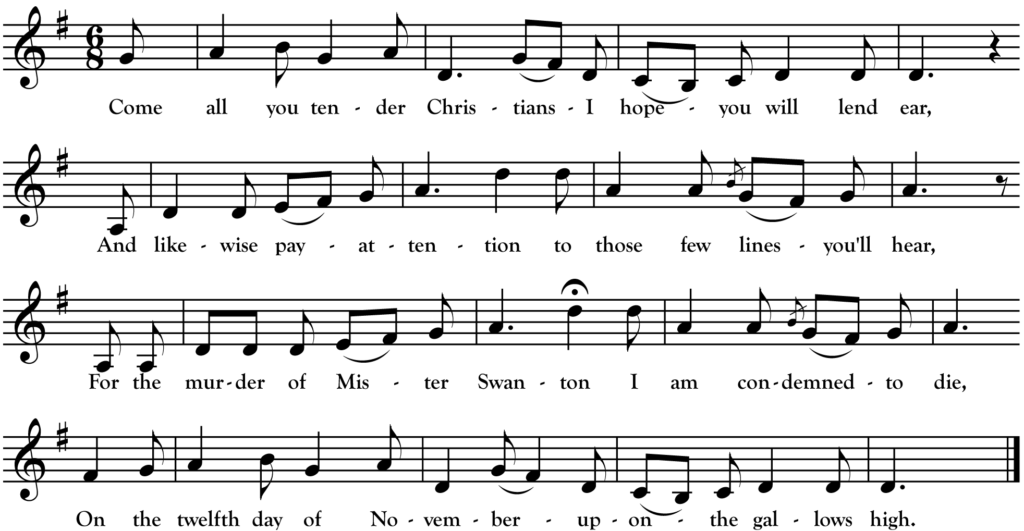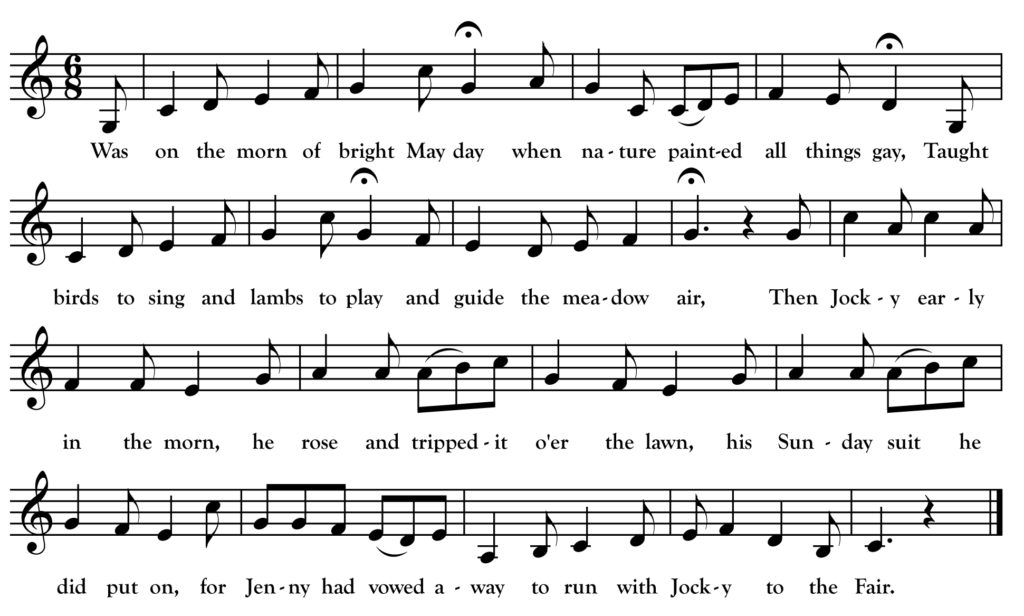Jack Rogers

Come, all you tender Christians, I hope you will lend ear,
And likewise pay attention to those few lines you’ll hear,
For the murder of Mr. Swanton I am condemned to die,
On the twelfth day of November upon the gallows high.
My name it is Jack Rogers, a name I’ll ne’er deny,
Which leaves my aged parents in sorrow for to cry,
It’s little did they ever think, all in my youthful bloom,
That I would come unto New York to meet my awful doom.
My parents reared me tenderly as you can plainly see,
And constant good advice they used to give to me,
They told me to shun night walking and all bad company,
Or state’s prison or the gallows would be the doom of me.
But it was in play houses and saloons I used to take delight,
And constantly my comrades they would me there invite,
I oft times was told by them that the use of knives was free,
And I might commit some murder and hanged I ne’er would be.
As Mr. Swanton and his wife were walking down the street,
All in a drunken passion I chanced them for to meet,
I own they did not harm me, the same I’ll ne’er deny,
But Satan being so near me, I could not pass them by.
I staggered up against him, ’twas then he turned around,
Demanding half the sidewalk, also his share of ground,
’Twas then I drew that fatal knife and stabbed him to the heart,
Which caused that beloved wife from her husband there to part.
It was then I went to Trenton, thinking to escape,
But the hand of Providence was before me, indeed I was too late,
It was there I was taken prisoner and brought unto the Toombs,
For to die upon the gallows, all in my youthful bloom.
I am thankful to the sheriff, who has been so kind to me,
Likewise my worthy counsellors, who thought to set me free,
And also to the clergyman, who brought me in mind to bear,
For to die a true penitent I solemnly do declare.
The day of my execution it was heartrending to see,
My sister came from Jersey to take farewell of me,
She threw herself into my arms and bitterly did cry,
Saying, “My well beloved brother, this day you have to die.”
And now my joys are ended, from this wide world I must part,
For the murder of Mr. Swanton I’m sorry to the heart;
Come, all you young ambitious youths, a warning take from me,
Be guided by your parents and shun bad company.
Sometimes doing the research into an old song’s background unlocks emotional weight that is hard to access from the words and melody alone. I found that to be the case with this grim ballad that was sung by Minnesotan Michael Dean, printed in his 1922 songster The Flying Cloud and subsequently recorded from Dean’s singing by Robert Winslow Gordon in 1924.
When I first came across it, it seemed like a tragedy in the form of a classic Irish come-all-ye like “The Croppy Boy” but without a noble cause behind the punished crime. It turns out that “Jack Rogers” describes a real and widely-publicized New York City murder from October 1857. Though there is no worthy motive here, the song sheds light on the hard and sometimes violent culture of Irish immigrant youths who came to New York in the wake of the Great Hunger.
Newspapers of the time reported that the “respectable old gentleman” John Swanston was returning from a market on a Sunday evening with his wife when they met three young Irish “loungers about the corners” at the corner of 10th Avenue and 21st Street. One of the three, 19-year-old Irish immigrant James Rodgers, allegedly provoked Swanston by letting his elbow stick out and hit him. An altercation ensued in which Swanston was fatally stabbed. Rodgers fled to a sister’s home in New Jersey but was apprehended and jailed in The Tombs – the Manhattan House of Detention of that time. After many appeals and much publicity, Rodgers was sentenced and hanged at The Tombs on November 12th, 1858.
Rodgers maintained throughout his captivity that he remembered nothing of the crime. This was generally attributed in the press, and in the subsequent ballad, to his being heavily intoxicated under the encouragement of his two friends. The song’s admonition to “shun bad company” sums up the newspapers’ take on the crime and the song could well have been written by someone who had access to the November 13th, 1858 New York Herald which lays this all out in detail.
Articles also talk about how exceptionally young, gentle and handsome Rodgers was and that he was always restrained and, if anything, sad when interviewed. He was well-loved by his family and the newspaper descriptions of their heartbroken hysteria at his execution are painful to read 115 years later. It is easy to see how the story inspired public sympathy. A prominent author of the time, Caroline Kirkland, even lobbied New York’s governor in hopes of staying the execution. In the end, Rodgers’ fate was held up as a warning to other potentially violent young men on New York’s streets.
The Library of Congress has a broadside ballad sheet of “The Lamentation of James Rodgers” that is clearly a match for the version sung by Michael Dean. Dean’s version (where the names have changed somewhat) is one of only a couple found in circulation among US singers. Another version was collected in Newfoundland and, interestingly, two versions turned up in Ireland. Sam Henry’s unpublished collection has one from the north and a snippet of a version from Kerry can be heard via the Muckross House Research Library site online.
Also, this is a good blog post about the James Rodgers crime and execution.


